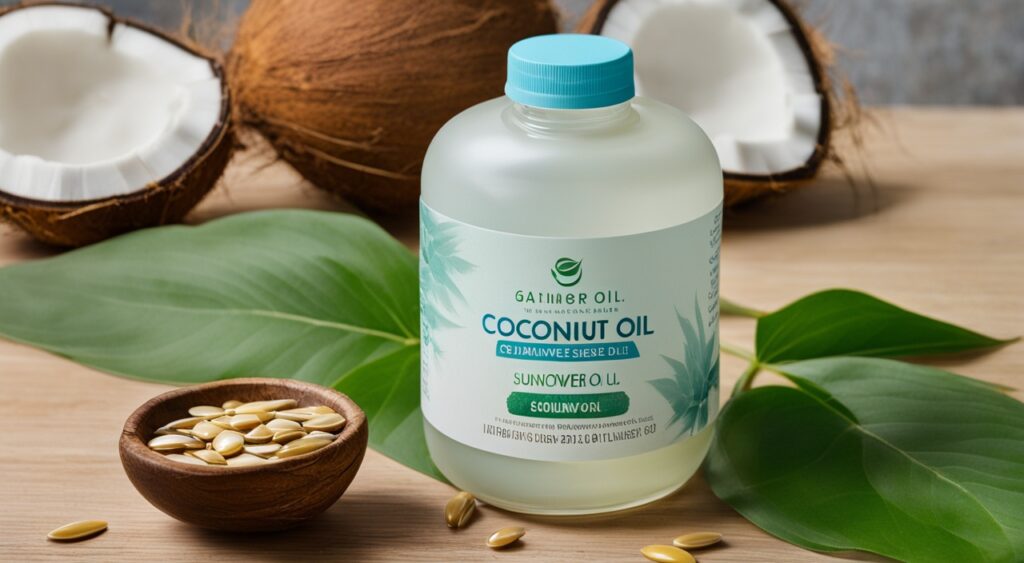What Are The Best Natural Remedies For Eczema?

Natural Remedies For Eczema : Eczema is a skin condition that many people find difficult to handle with just traditional medicine. It often brings on dry, itchy patches. Because of this, over half those dealing with eczema have started to look at natural and home options.
These methods aim to help people soothe their symptoms and better manage the condition. They may not be a complete fix, but they offer relief to many. Some popular natural remedies include aloe vera and coconut oil.
Key Takeaways
- Eczema is a chronic skin condition that can be challenging to manage with conventional treatments alone.
- Many eczema patients have turned to natural remedies, such as aloe vera, coconut oil, and dietary adjustments, to help alleviate their symptoms.
- Home remedies like colloidal oatmeal baths and herbal therapies may provide relief by reducing inflammation, itching, and bacterial growth on the skin.
- Complementary therapies, including stress management and the use of gentle fabrics, can also play a role in managing eczema symptoms.
- While natural remedies can be helpful, it is important to consult with a healthcare provider to develop a comprehensive treatment plan for eczema.
Introduction
Understanding eczema is no easy task. It’s still without a clear cure, despite lots of research. Yet, natural remedies can ease the soreness and itchiness. They won’t work the same for everyone, but checking out eczema home remedies and eczema natural treatments might help. It could make life better for those dealing with this long-term skin issue.
Also Read : What Are The Symptoms Of Skin Cancer?
Many folks are looking for ways to soothe their eczema and take care of their skin. They’re finding out about eczema alternative treatments and eczema natural remedies. Even though scientists are still learning about these ideas, they could open new paths for handling eczema.
Also Read : What Is Rosacea And Its Symptoms?
Navigating the World of Natural Eczema Treatments
Eczema, or atopic dermatitis, is a worldwide issue. It causes a lot of discomfort. People around the globe are looking for a natural eczema cure. This has led to the growth of diy eczema remedies and eczema natural remedies. These aim to make life better for those with eczema.
Also Read : Discovering The Best PHD Scholarships For USA Students
Some eczema alternative treatments look like they could help. But it’s wise to keep some doubt. The proof these treatments work might not be strong. Even so, trying out these eczema home remedies could go well with standard medical care. This offers a full way to tackle this tough condition.
Also Read : Exploring PHD Scholarship Opportunities In 2024
“The search for eczema relief and eczema skin care solutions has led many individuals to explore eczema alternative treatments and eczema natural remedies.”
We’re going to talk about some promising natural eczema treatments. We’ll also look at eczema natural remedies. This info will help folks with eczema choose wisely. They can find the diy eczema remedies that match their needs and likes.
Also Read : How To Applying For Merit Based MBA Scholarship Programs ?
Aloe Vera Gel

Aloe vera gel comes from the aloe plant’s leaves, and it’s well-known as a natural treatment for several skin problems. It’s especially good for dry, itchy skin like that seen in eczema. This gel has many benefits that help soothe eczema and heal wounds.
Antibacterial and Antimicrobial Properties
Aloe vera gel is great because it fights off bacteria and microbes. This is important for people with eczema since they have a higher risk of skin infections. By stopping the bad bacteria from growing, aloe vera creates a shield on the skin. This supports the natural healing of the skin.
Immune-Boosting Benefits
Moreover, aloe vera gel boosts your immune system. This can lessen the inflammatory response linked with eczema. Thus, it might reduce how severe flare-ups are, offering relief over time.
Wound Healing Capabilities
The gel also helps heal wounds quickly. This is perfect for the damaged, inflamed skin that shows up with eczema. Aloe vera hydrates the skin and speeds up healing. Its anti-inflammatory ability also lessens redness and swelling.
For managing eczema, aloe vera is a great natural remedy. It uses its antibacterial, immune-boosting, and wound-healing powers. It’s a key part of treating eczema and supporting skin improvement.
Coconut Oil and Sunflower Seed Oil

Coconut oil and sunflower seed oil are great for treating eczema. They have many benefits. These benefits involve reducing dryness, itchiness, and inflammation caused by eczema.
The Benefits of Coconut Oil for Eczema
Coconut oil contains helpful fatty acids like lauric and caprylic acid. They moisturize the skin well. Virgin coconut oil can also cut down on inflammation and better the skin’s protective barrier.
Coconut oil’s anti-microbial features can keep skin infections away. This is common with eczema. Applying coconut oil can lessen redness, scaling, and discomfort.
The Skin-Soothing Power of Sunflower Seed Oil
Sunflower seed oil is also good for eczema. It has anti-inflammatory qualities. This helps calm the skin when it’s itchy and irritated.
It also makes the skin’s barrier stronger. Plus, it supports the immune system. This might lower the severity of eczema flare-ups. Lots of eczema products use sunflower seed oil because it’s so helpful.
Using coconut oil and sunflower seed oil can really help eczema. It can improve symptoms and make the skin healthier.
Dietary Adjustments

Managing eczema involves what you eat. Adding anti-inflammatory foods to your meals might lessen flare-ups. It fights the body’s inflammation. There’s not a single diet for everyone with eczema. But, making some dietary changes can help people dealing with this condition.
Anti-Inflammatory Foods for Eczema
Eating a lot of fruits, vegetables, and fatty fish is good for those with eczema. These foods can reduce inflammation linked to eczema outbreaks.
The top anti-inflammatory foods for eczema are:
- Fatty fish, like salmon, mackerel, and sardines, have lots of omega-3
- Berries, including blueberries, raspberries, and strawberries, are full of antioxidants
- Green leafy vegetables, such as spinach and kale, offer many vitamins
- Nuts and seeds, like almonds, walnuts, and chia seeds, contain healthy fats and fiber
- Turmeric, ginger, and other anti-inflammatory herbs and spices
By adding these nutritious, anti-inflammatory foods to your eczema diet plan, you can help control symptoms and improve skin health.
Avoiding Trigger Foods
Aside from eating anti-inflammatory foods, steer clear of food triggers. Dairy, gluten, and processed foods can worsen eczema for some people.
Notice how your body reacts to different foods. Then, you can cut out what you need to, helping you manage your eczema and keep your skin healthy.
| Anti-Inflammatory Foods | Potential Eczema Trigger Foods |
|---|---|
|
|
Choose the right foods and add anti-inflammatory options to your meals. Doing this is key to managing your eczema symptoms and keeping your skin healthy.
Natural Remedies For Eczema
Dealing with eczema means fighting against dry and itchy skin every day. Though there’s no cure, natural remedies offer relief and help control symptoms. From aloe vera to coconut oil, many plant-based options help soothe the discomfort of eczema.
Aloe vera gel has antibacterial and anti-inflammatory benefits. For those with eczema, it can make a big difference. It feels cool on the skin, reduces irritation, and promotes healing, preventing infection.
Coconut oil is also a great natural remedy. It’s packed with good fatty acids. This makes it an ideal moisturizer, keeping the skin hydrated and not too dry. Plus, its antimicrobial properties fight off bacteria, which can worsen eczema.
Eczema relief can also come through what you eat. Adding foods that fight inflammation, like fatty fish and certain fruits and vegetables, might lessen eczema’s effects.
“Natural remedies can be a safe, effective option for eczema, avoiding the risks that come with some medicines.”
There are also eczema natural remedies besides creams and diet changes. Taking colloidal oatmeal baths, trying acupressure, and wearing soft clothes can help. This holistic approach allows people to tailor a treatment that fits their skin and lifestyle.
There’s no simple cure for eczema. But, through trial and error, people can discover natural treatments that are right for them. Being persistent and patient with these natural remedies can bring much relief and make life better for those with eczema.
Bathing Techniques
Driving eczema under control involves having a smart bathing plan. Try out baths like colloidal oatmeal, bleach, and vinegar to see a change. These methods can lower swelling, itchiness, and harmful bacteria on your skin.
Colloidal Oatmeal Baths
Colloidal oatmeal comes from ground and boiled oats, producing a healing mix. A study from 2015 showed it cuts itch and dry skin. This is a plus for folks with eczema.
Bleach Baths
Bleach can fight off bacteria on the skin, such as Staphylococcus aureus, preventing some infections. Soaking in bleach baths might help fix your skin’s ‘microbiome’ and lead to clearer skin.
Vinegar Baths
Using vinegar as a wash is ancient, and its pH levels are what your skin loves. This might help to calm your skin and speed up healing.
For eczema, keeping your skin moisturized and hydrated is key. These natural bath options could offer real benefits. They can soothe your skin and make it healthier.
| Bathing Technique | Key Benefits |
|---|---|
| Colloidal Oatmeal Baths | Reduces itchiness and skin dryness, has antioxidant and anti-inflammatory properties |
| Bleach Baths | Kills bacteria on the skin’s surface, helps restore the skin’s microbiome |
| Vinegar Baths | Reduces inflammation and promotes healing, helps maintain the skin’s optimal pH balance |
Herbal and Plant-Based Remedies

Some herbs and plants are showing they might help with eczema. Honey, tea tree oil, and calendula have benefits like fighting bacteria, reducing swelling, and healing skin. This makes them good candidates for eczema relief.
Honey for Eczema Relief
Honey works as both an antibacterial and an anti-inflammatory. It’s been a healing agent for wounds for a long time. In 2015, experts found that honey can also improve the immune system. So, it might help prevent infections linked to eczema.
Tea Tree Oil for Eczema
Tea tree oil is from the Melaleuca alternifolia tree leaves. A 2012 study discovered its properties like fighting inflammation, bacteria, and healing wounds. These make it a possible remedy for eczema.
Calendula for Eczema
Calendula also has benefits including fighting bacteria, reducing swelling, and healing skin. It has a long history of use for various skin issues, including eczema.
“Herbal and plant-based remedies like honey, tea tree oil, and calendula offer a natural approach to managing the symptoms of eczema.”
Despite needing more study, herbal and plant-based remedies could be a natural, effective way to reduce the discomforts of eczema.
Complementary Therapies
Traditional treatments help, but complementary therapies can do more for eczema. Things like acupressure, stress management, and wearing soft fabrics can reduce eczema symptoms. They make people feel better too.
Acupressure for Eczema
Acupressure is like acupuncture but gentler, using no needles. A study in 2011 looked at 15 adults with bad eczema. The group that tried acupressure at a certain point on their elbow using a BB-sized pellet felt less itchy and saw better skin after four weeks. This was compared to a group who didn’t try acupressure.
Stress Management for Eczema
Stress often makes eczema worse. It’s key to learn how to say “no,” avoid too much alcohol, spend time outdoors, work out, and talk about your feelings. These tips from the National Eczema Association can help lessen stress and maybe make your eczema symptoms milder.
Gentle Fabrics for Eczema
The type of clothes you wear matters in eczema care. Clothes not made of natural fibers like polyester, nylon, or wool can make eczema worse. On the other hand, clothes made of 100% cotton, bamboo, and silk are good choices because they let the skin breathe. This means they’re less likely to cause skin issues.
“Complementary therapies like acupressure, stress management, and the use of gentle fabrics can be valuable additions to an eczema management plan, helping to alleviate symptoms and promote overall well-being.”
Using these extra therapies along with regular treatments can help improve life for people with eczema.
Also read: 10 Natural Remedies To Banish Pimple Scars
Conclusion
Eczema doesn’t have a cure, but natural remedies can help. Items like aloe vera, coconut oil, and dietary changes can soothe skin. They help natural remedies for eczema by reducing symptoms.
Options for eczema relief and eczema skin care include baths and herbal remedies. These offer eczema home remedies and natural eczema cure. Nevertheless, for serious cases, it’s wise to see a doctor.
Using natural remedies for eczema is a proactive step in taking care of one’s skin. It offers hope without the risk of common treatments’ side effects. With dedication, people can manage their eczema effectively.
FAQs
What are the best natural remedies for eczema?
Some top natural remedies for eczema are aloe vera gel, coconut oil, and sunflower seed oil. Others include dietary changes, colloidal oatmeal baths, and honey. Tea tree oil and calendula are also beneficial.
How can aloe vera gel help soothe eczema?
Aloe vera gel is known for its healing powers. It fights off bacteria and boosts the immune system. This makes it great for healing skin and reducing eczema.
How can coconut oil and sunflower seed oil benefit eczema?
Coconut oil and sunflower seed oil work well to moisturize the skin. They reduce dryness, itchiness, and inflammation. This is because they contain good fats and fight off germs.
Can dietary adjustments help manage eczema?
Eating foods that fight inflammation might lower eczema flare-ups. These include fruits, veggies, and fatty fish.
What other natural remedies can help with eczema?
Colloidal oatmeal baths, vinegar baths, and bleach baths can be helpful. Honey, tea tree oil, and calendula also soothe the skin. Other remedies include acupressure, managing stress, and using soft clothes.
Can natural remedies completely cure eczema?
Natural remedies can’t cure eczema entirely. They do help with symptoms. They’re good for managing flare-ups and keeping the skin healthy.
Are natural eczema remedies safe for babies and children?
Yes, many natural remedies are safe for kids with eczema. Still, it’s best to check with a doctor first. Some treatments might not be right for young skin.
